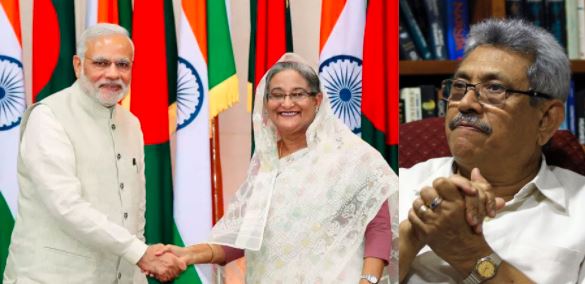The volatile government of Sri Lanka headed by President Gotabaya Rajapaksa has once again tried to antagonise India by making veiled remarks that are aimed at New Delhi after it didn’t take its side in the UNHRC, earlier this month. In a report published in The Hindu, Rajapaksa said that Sri Lanka did not want to be in midst of the power struggles of the Indian Ocean Region (IOR).
“The government does not wish to be associated with the power struggles in the Indian Ocean region by the global giants,” Rajapaksa said whilst referring to India and China.
Moreover, India’s stance of the Sri Lankan government, expected to do more for the Sri Lankan Tamils, has ruffled some feathers within the Rajapaksa government. Quoting Gotabaya, the newspaper said that Sri Lanka will not allow other countries to achieve their geopolitical needs by introducing “separatism under the guise of power devolution” in the island nation.
As reported by TFI, India had abstained from voting on a resolution against Sri Lanka adopted by the UNHRC in Geneva against the island nation’s human rights record. The resolution came as a huge setback to Colombo even though it made concerted efforts to garner international support ahead of the voting.
The Sri Lankan government flirted with the idea of managing both India and China and by showing the carrot to both the countries, milked the most out of them. However, this exercise has turned out to be counterproductive as Sri Lanka misjudged PM Narendra Modi’s goodwill.
And now a miffed Rajapaksa is making indirect remarks on India that it will not help it in attaining its Indian Ocean Region dreams where New Delhi is merely taking all the necessary steps to keep China at bay, so that, smaller countries like Sri Lanka are not made colonies by China.
“We will face the Geneva challenge without fear. We will never succumb to pressures. We are a free nation. We will not be a victim of big power rivalry in the Indian Ocean,” said Rajapaksa.
The IOR has been a tug of war between India and China where the former is looking to push back Beijing which is trying to encircle India by bagging smaller countries like Sri Lanka. The annexation of Hambantota port being a prime example of China’s quest to impose its supremacy in the region while a naïve Colombo, time and again thinks of India as its foe.
While Sri Lanka has had repeated opportunities to mend ties with India and keep an expansionist China at bay, it seems like the Gotabaya administration suffers from the Stockholm syndrome and keeps on tugging to the paper dragon.
Sri Lanka’s aversion towards India can be gauged by the fact that in recent times it has cancelled some important infrastructure projects which could have brought New Delhi and Colombo closer.
As reported by TFI, the Gotabaya Rajapaksa cabinet recently cancelled the trilateral Eastern Container Terminal (ECT) project between Sri Lanka, Japan, and India. The East terminal will now be 100 per cent owned and operated by the state-owned Sri Lanka Port Authority (SLPA).
The complete volte-face from the Sri Lankan regime had come as a shocker to many experts keeping an eye on the developments. India’s External Affairs Minister S Jaishankar had visited Colombo last year to give the final touches to the deal and it looked like signing the agreement was a mere formality now.
While comparing the similar situation with India’s eastern neighbour Bangladesh, one can see a clear strategy by the Sheikh Hasina government where it is consciously moving towards India, unlike the island nation.
The recent visit by Prime Minister Narendra Modi to Bangladesh further cemented the fact that both nations had come much closer despite Dhaka being a part of China’s BRI. Moreover, the simple reason that PM Modi chose Dhaka as the venue for his first foreign visit since the COVID-19 induced lockdown last year, speaks volumes about the bilateral relationship between the two nations.
“India is our most important partner and you cannot conceive of anything different. It would be suicidal to think differently,” Gowher Rizvi, international affairs advisor to Prime Minister Sheikh Hasina recently said in an interview.
Read more: “India is our most important partner,” Bangladesh makes it clear to China and Pakistan
In a testament to India’s diplomatic prowess, the Bangladesh government has officially cancelled the Sonadia Deep-Sea Port project. The port situated on the Bay of Bengal would have further enhanced China’s economic and strategic ambitions as the dragon was keen on both constructing and financing the project.
Read more: India and Japan snatch Bangladesh from Xi Jinping as China gets kicked out of the port project
Instead, Bangladesh is now planning to develop a deep-sea port at Matarbari, 25 km away from Sonadia with the help of Japan, with the port expected to be functional by 2025. It is pertinent to note that Japan and India share close relations and India will have no qualms about the involvement of Japan in Bangladesh.
Both the case studies present two different scenarios and how particular regimes have acted towards New Delhi. While Bangladesh has shown faith in the Modi government and reaped rewards for it, the Rajapaksa government on the other hand is still confused in which direction it wants to punt its fortunes. If there is something Sri Lanka wants to learn in the art of bilateral diplomacy, it should look no further than Bangladesh and take some lessons.
